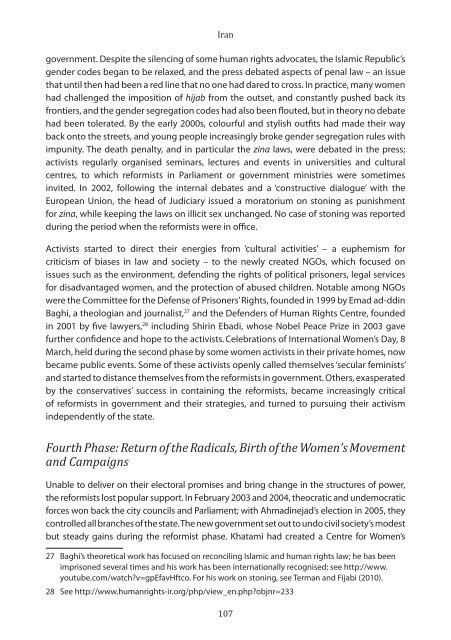control and sexuality
control and sexuality
control and sexuality
- No tags were found...
You also want an ePaper? Increase the reach of your titles
YUMPU automatically turns print PDFs into web optimized ePapers that Google loves.
Irangovernment. Despite the silencing of some human rights advocates, the Islamic Republic’sgender codes began to be relaxed, <strong>and</strong> the press debated aspects of penal law – an issuethat until then had been a red line that no one had dared to cross. In practice, many womenhad challenged the imposition of hijab from the outset, <strong>and</strong> constantly pushed back itsfrontiers, <strong>and</strong> the gender segregation codes had also been flouted, but in theory no debatehad been tolerated. By the early 2000s, colourful <strong>and</strong> stylish outfits had made their wayback onto the streets, <strong>and</strong> young people increasingly broke gender segregation rules withimpunity. The death penalty, <strong>and</strong> in particular the zina laws, were debated in the press;activists regularly organised seminars, lectures <strong>and</strong> events in universities <strong>and</strong> culturalcentres, to which reformists in Parliament or government ministries were sometimesinvited. In 2002, following the internal debates <strong>and</strong> a ‘constructive dialogue’ with theEuropean Union, the head of Judiciary issued a moratorium on stoning as punishmentfor zina, while keeping the laws on illicit sex unchanged. No case of stoning was reportedduring the period when the reformists were in office.Activists started to direct their energies from ‘cultural activities’ – a euphemism forcriticism of biases in law <strong>and</strong> society – to the newly created NGOs, which focused onissues such as the environment, defending the rights of political prisoners, legal servicesfor disadvantaged women, <strong>and</strong> the protection of abused children. Notable among NGOswere the Committee for the Defense of Prisoners’ Rights, founded in 1999 by Emad ad-ddinBaghi, a theologian <strong>and</strong> journalist, 27 <strong>and</strong> the Defenders of Human Rights Centre, foundedin 2001 by five lawyers, 28 including Shirin Ebadi, whose Nobel Peace Prize in 2003 gavefurther confidence <strong>and</strong> hope to the activists. Celebrations of International Women’s Day, 8March, held during the second phase by some women activists in their private homes, nowbecame public events. Some of these activists openly called themselves ‘secular feminists’<strong>and</strong> started to distance themselves from the reformists in government. Others, exasperatedby the conservatives’ success in containing the reformists, became increasingly criticalof reformists in government <strong>and</strong> their strategies, <strong>and</strong> turned to pursuing their activismindependently of the state.Fourth Phase: Return of the Radicals, Birth of the Women’s Movement<strong>and</strong> CampaignsUnable to deliver on their electoral promises <strong>and</strong> bring change in the structures of power,the reformists lost popular support. In February 2003 <strong>and</strong> 2004, theocratic <strong>and</strong> undemocraticforces won back the city councils <strong>and</strong> Parliament; with Ahmadinejad’s election in 2005, they<strong>control</strong>led all branches of the state. The new government set out to undo civil society’s modestbut steady gains during the reformist phase. Khatami had created a Centre for Women’s27 Baghi’s theoretical work has focused on reconciling Islamic <strong>and</strong> human rights law; he has beenimprisoned several times <strong>and</strong> his work has been internationally recognised; see http://www.youtube.com/watch?v=gpEfavHftco. For his work on stoning, see Terman <strong>and</strong> Fijabi (2010).28 See http://www.humanrights-ir.org/php/view_en.php?objnr=233107


